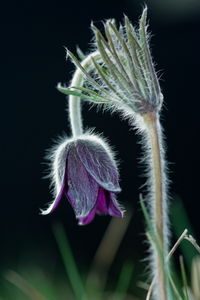Homeopathic Pulsatilla
The central essence of Pulsatilla is changeability with softness. It is primarily a feminine remedy. The Pulsatilla person typically requires strong support from those around her.[1]
Source
- Plant: Pulsatilla nigricans, also known as Wind Flower
- Short Form: Puls
Indications
The following are the main indications for Pulsatilla.[2], [3]
Acute Conditions
| Article | It Was a Pulsatilla Day, NDNR; 2012 May |
|---|
- Breastfeeding where milk is absent, disappears or is thin, watery, and bad. Nursing pain extends from nipple to chest, neck, back; pain changes place. Cracked inflamed nipples. Weeps with nursing. During or after weaning, breasts swell, feel very stretched and sore. Flow of milk or acrid fluid in non-nursing woman or before puberty.
- Cough, moist, loose, in the morning and through the day but dry and tight in evening and night. Profuse green, bitter or tasteless expectoration. Pressure, soreness of chest. Short of breath in warm room and lying down. Needs to sit up in bed in order to get relief.
Chronic and Constitutional Conditions
- Amenorrhea, lack of menses at puberty. Missed periods from getting feet wet, exhaustion, or anemia. Late, scanty menses, flow stops and starts; clotted, irregular, changeable symptoms. Thick, creamy vaginal discharge. Mild, emotional, weeping, yet irritable. Likes sympathy and company.
- PMS, sad, weepy, sensitive, desires sympathy. Snappish, demanding. Chilliness, yawning, and stretching. Burning discharge. Heaviness, like a stone in the abdomen.
- Depression, sweet, mild, gentle, can't refuse others. Needs to give and receive love. Feels forsaken. Desires company and consolation, but irritable and snappish. Emotional, weeping easily, moody. Guilt and shame. Rigid ideals, picky.
- Low Self-Esteem, mild, timid, shy, changeable emotions, weepy, wants sympathy and contact. Passive, co-dependent, can't say no, pleasing others. Submissiveness. Fear to be alone, forsaken feeling. Rigid moral or religious views. Affectionate but gives to receive.
Children and Adolescents [4], [2]
- Generally, Pulsatilla children are mild, timid, pleasant, clingy children whose emotions rule them. They typically are moody and weep easily. They fear abandonment and are jealous of younger siblings. These states are ameliorated by consolation.
- Chickenpox, Mumps, and Measles accompanied by respiratory tract infections. Infections produce thick, bland, yellow or green discharges.
- Ear Infections (Otitis media), ear is hot, red swollen; severe stitching pain, roaring sounds. Itching. Yellow, thick discharge. Deafness, stopped up feeling, pressure outward. Especially after colds, measles.
Other common conditions: Acne, Wandering Arthritis, Colds and Flu, Fibrocystic Breast Disease, Drug detox (antidote to antibiotics), Eye inflammation, Hives, Incontinence, Indigestion, Knee conditions, Nausea, Vaginitis, Varicose Veins
Characteristics
- Triggers: grief, loss, jealousy, anticipation, disappointment, indignation
- General: predominately a female remedy; temperament and symptoms change very quickly; cries very easily; easily overheated and uncomfortable in warm, stuffy rooms; wants to be outside in the open air; wants others around her, especially when she is sick, thirstless
- Worse: heat, getting feet wet, rich foods
- Better: open air, slow walking in open air, cold applications, food, or drinks
- Psychological: soft, affectionate, and wants attention, indecisive, highly emotional
- Other symptoms: wandering pains, pains worse first motion but better with movement, sleeps on the abdomen or on the back with arms raised over the head
- Food and drink: desire for rich and creamy foods such as peanut butter, butter, or ice-cream, aversion to fat, milk, or pork, aggravated from pork and rich foods, not thirst
Prescribing Considerations
Homeopathic remedies are prescribed based on homeopathic principles and after a detailed case taking. The prescription recommendations below are provided only as a guide. It is always recommended to consult with a naturopathic doctor or homeopathic practitioner prior to taking any homeopathic remedies, especially if your health is compromised or if your symptoms due to resolve in a timely fashion. The general recommendations for Pulsatilla include:[5]
- Penthorum is often indicated after Pulsatilla in later colds. Ionesia Asoca - Saraca indica - (Amenorrhea, menorrhagia, acts powerfully on female organs. Abdominal pain), Atriplex (uterine symptoms, hysteria, coldness between shoulders, dislike of warm foods, craves strange foods, palpitation, sleeplesness).
- Compare: Cyclamen, Kali bichromicum, Kali sulphur, Sulphur, Pimenta - Allspice - (one-sided neuralgias, parts of body hot and cold), Anagyris (headache, amenorrhea)
- Complementary: Coffea, Chamomilla, Nux vomica
References
- ↑ Morrison Roger (1993) Desktop Guide, to Keynote and Confirmatory Symptoms Hahnmann Clinic Publishing
- ↑ 2.0 2.1 Hershoff Asa (2000) Homeopathic Remedies, A Quick and Easy Guide to Common Disorders and their Homeopathic Treatments Avery Publishing Group, New York.
- ↑ Ullman Robert, Reichenberg-Ullman Judyth (1997) Homeopathic Self-Care, the quick and easy guide for the whole family. Prima Publishing.
- ↑ Herscu Paul (1991) The Homeopathic Treatment of Children, Pediatric Constitutional Types, North Atlantic Books.
- ↑ Boericke W (1997) Pocket Manual of Homoeopathic Materia Medica and Repertory, a Chapter on Rare and Uncommon Remedies, B. Jain Publishers, India.
